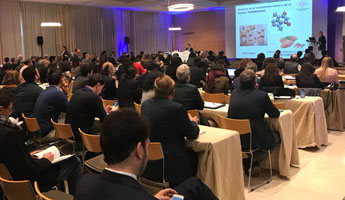

LELR-AEU 2018 Meeting report
Advances in the treatment and medical management of lithiasis, which affects 15% of Spain’s population and is increasing considerably, namely renal lithiasis, were the focus of the 28th National Meeting of the Groups of Lithiasis, Endourology, Laparoscopy and Robotics organized by the Spanish Association of Urology on January 25 and 26 in Cordoba.
“All patients suffering from uric acid lithiasis should have a device in their home to self-monitor urinary pH, in addition to being taught how to use it and thus avoid treatment failure”, explained Dr. Carlos Torrecilla, National Coordinator of the Lithiasis Group, during the meeting’s plenary session in which the room was fully occupied with more than 300 urologists. The European Guides also recommend it as a new way to approach the medical management of this chronic disease.
“The problem is that until recently monitoring was carried out with a test strip that is not sufficiently accurate, for example, to distinguish urinary pH of 5.5 from a urinary pH of 5.8. If this is not calculated correctly, a relapse is likely to happen”, stated Dr. Fèlix Grases, Professor at the University of the Balearic Islands and Director of the Laboratory of Renal Lithiasis Research.
In this sense, Dr. Juan Antonio Mainez, endourologist at the Hospital Universitario La Paz in Madrid, emphasised the new alternatives for the management of patients with lithiasis, such as Devicare’s Lit-Control®, which gives the patient more control and allows them to self-monitor urinary pH in their home in an accurate and controlled way. Since 2017, Lit-Control® has been introduced into European and Latin American countries.
Theobromine to inhibit stone formation
Another innovation presented during the meeting was theobromine, a cacao extract with beneficial effects. Chocolate contains theobromine, but a very high consumption of this food would be necessary, which is contraindicated due to its high calcium oxalate content.
Dr. Grases discussed the initial results of a double-blind study with patients, which is carried out in collaboration with the Hospital de Manacor and Devicare to demonstrate the inhibiting effect of this new natural substance. “We have seen that the theobromine-rich cacao extract, along with the controlled alkalinisation of urinary pH, reduces the formation of uric acid crystals and the number of colics by more than 50%. This points toward a hopeful future in which efficiency in the preventive management of a stone type that is highly prevalent and has the tendency to relapse is improved”, he affirmed.
For the theobromine to reach the patient, it can be incorporated into dietary supplements, as suggested in this scientific poster by the doctors Costa-Bauzá, Grases, Calvó, Rodríguez and Prieto. This year Devicare intends to enrich its current formulation of reference Lit-Control pH Up® (which alkalises urinary pH) with theobromine.
Another specialist, in this case the President of the Argentine Society of Urology, Dr. Roberto Hernández, spoke about the ideal characteristics of double-J stents during his talk and emphasised that some of the most common complications, such as the calcification and blockage of the same, can be avoided with proper acidification of urine, together with the help of crystallisation inhibitors.
Specialists show an increasing interest in Lit-Control®
During the two-day long meeting, Devicare presented the Lit-Control® innovative method in the exhibition area with the medical equipment and in the sales area. Currently, it is the only medical solution that is offered internationally to self-monitor urinary pH in order to prevent and avoid the recurrence of renal lithiasis and other urological pathologies, such as urinary infections or overactive bladder.





